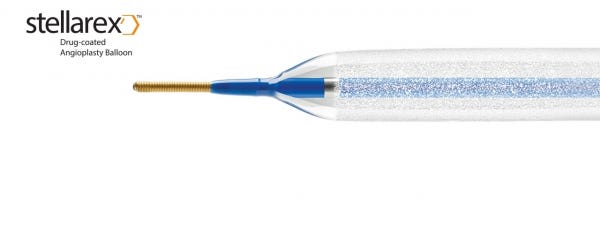June 28, 2017
The company was previously called out by an analyst as an attractive acquisition target because of its coveted Stellarex drug-coated balloon technology, which is expected to hit the U.S. market this year.
Amanda Pedersen

The Stellarex drug-coated balloon is expected to hit the U.S. market sometime this year. The device, which is used for angioplasty procedures, has shown a lot of promise in clinical trials and in commercial experience in Europe, where it has been available since January 2015.
There may be other, more obvious suitors for Spectranetics Corp. than Philips, but those potential acquirers seem to have a lot on their plate right now and are unlikely to engage in a bidding war for the company, according to multiple analysts. Royal Philips, of Amsterdam, the Netherlands, said it would pay $38.50 a share for Spectranetics, which is about $2.2 billion, including cash and debt.
The fact that the Colorado Springs, CO-based company is being bought did not come as a surprise, especially because one medtech analyst previously called Spectranetics out as an attractive acquisition target.
What makes Spectranetics such a hot deal right now is that its Stellarex drug-coated balloon (DCB) is expected to hit the U.S. market later this year. The angioplasty device has already shown promising results in Europe, where it has been on the market since January 2015, and in a U.S. pivotal study.
"We view Stellarex as the coveted asset in the deal," said Jason Mills, of Canaccord Genuity. He said the Stellarex platform, which is used for angioplasty procedures, represents a "no-compromise solution," with best-in-class results in both less and more complex patient populations, according to data from a European randomized controlled trial and from a U.S. pivotal study.
Mills said late last year that he expected Spectranetics to be scooped up by a major medical device company before Halloween 2017, and sure enough, Philips fulfilled that prophecy for the analyst.
The company also has a strong pipeline behind Stellarex, Mills noted in a report, including a below-the-knee indication that the company is already in talks with FDA about for a trial that could begin later this year, an indication to treat in-stent restenosis, and an indication to use Stellarex for arteriovenous fistulas. Spectranetics also has a new laser platform in the works, as well as an advanced atherectomy catheter technology designed to address calcium, Mills said.
Three of the largest peripheral vascular companies (C.R. Bard, Boston Scientific, and Medtronic) already have DCBs, and Rick Wise of Stifel said this makes them unlikely to go after Spectranetics. Bard, in particular, would be an improbable contender because it is being acquired by Becton, Dickinson and Company.
Wise noted that there are three major companies that lack DCBs and atherectomy (Abbott Laboratories, Cardinal Health, and Terumo), but he suspects that both Abbott and Cardinal Health are too preoccupied with other deals at the moment to pursue Spectranetics. Terumo could have an interest in the company, he said, but he is unsure of its acquisition strategy.
The acquisition price represents a 27% premium over the company's closing stock price Tuesday, before the deal was made public.
Frans van Houten, CEO of Royal Philips, said the company is ready to accelerate its strategic expansion into therapy devices, which this acquisition will do. The deal is expected to be revenue growth and profit accretive by 2018, he said, given the projected revenue and other synergies.
Spectranetics' shareholders reacted favorably to the news, sending the stock (Nasdaq: SPNC) up 26.15% ($7.95) to close at $38.35 Wednesday on substantially higher than average trading volume.
About the Author(s)
You May Also Like


